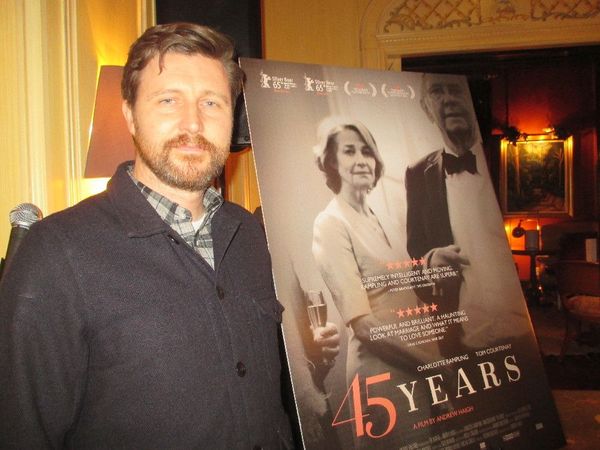 |
| 45 Years director Andrew Haigh Photo: Anne-Katrin Titze |
Before my conversation with Charlotte Rampling on 45 Years at the Plaza Athénée, where Robert Redford was spotted, I spoke with Andrew Haigh, who won the Michael Powell Award at this year's Edinburgh International Film Festival, about an Alfred Hitchcock Vertigo connection, Max, the German Shepherd, not Max Mon Amour's chimpanzee, Bluebeard, and ghosts in the attic.
 Kate (Charlotte Rampling) 2_225.jpg) |
| Geoff (Tom Courtenay) with Kate (Charlotte Rampling) |
Rampling stars with Tom Courtenay as Kate and Geoff Mercer. Their life in rural Norfolk, without children, comfortable in their cottage, is one of routine. Kate's early walks with their dog Max start the day and a home-cooked meal, a glass of wine and a good book end it. 45 Years is based on the David Constantine short story In Another Country.
When we first meet her on the daily stroll, Kate hums Smoke Gets in Your Eyes, a meaningful song for their life as a couple and one she is choosing for the upcoming anniversary celebration. Smoke will rise in altogether different ways pretty soon. After the letter arrives, announcing that the body of Geoff's former girlfriend Katya has been found, frozen in a Swiss glacier, since 1962, he starts smoking again. Kate does not protest and brings him an ashtray instead. Katya, "my Katya", as Geoff calls the woman he loved before he ever met Kate, is the catalyst that allows us to discover the dynamics of the couple.
It is through dancing and lip-synching, two most unexpected choices, that most is revealed to us. Haigh explores some of cinema's great obsessions - the what-if-ness of an alternative reality the medium embraces and the beautiful, unchanged, ageless faces, frozen in light, on ice, if you will, that haunt from beyond the grave. "Funny, how you forget things that make you happy."
_225.jpg) |
| Andrew Haigh with Charlotte Rampling at the Plaza Athénée Photo: Anne-Katrin Titze |
Anne-Katrin Titze: I like that you structure your film with the days of the week leading up to the anniversary. Was that structure part of the short story?
Andrew Haigh: I don't think it was in the original story. I just liked the idea of having a real countdown. If you separate those days up, which I really liked the idea of. And I love the way it kind of makes more of the fact that they've been together 45 years and then they can fall apart within just five days.
AKT: There are many details - I loved how you use the dog. At first one might think he is there for the structure of the day, the morning walk. Then the dog becomes this Vertigo thing.
AH [laughing]: I mean the dog - we used that dog all the time. It was a nightmare to work with the dog but we used it a lot. It's like it knows the secrets between the two of them, which is interesting. Also, even calling the dog Max, we felt was a German name. It was like Maximilian. And why did they call it Max? And was it his [Geoff's] decision?
AKT: And, it's a German Shepherd.
AH: And it's a German Shepherd! It was all those things. It was his dog. Why did he choose a German Shepherd? It's one of those other things for Kate that can just be in her mind. I love that dog when it's barking loudly as she's trying to go up into the attic. Is the dog warning her, "don't go in there?"
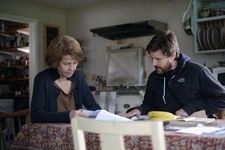 |
| Andrew Haigh on Charlotte Rampling's character: "It was about Kate's crisis - more than about anything else." Photo: Anne-Katrin Titze |
AKT: Yeah, it's the mythical dog as threshold guardian, too. Did you actually think of Vertigo at all?
AH: Not really. But thinking about it, it's a good reference.
AKT: Modeling your life after something you experienced in the past - that has some Vertigo to it.
AH: It absolutely does. And it's comparing yourself to someone in the past and feeling like that past is infecting you, infecting everything around you.
AKT: Even her asking "was she a blonde?"
AH: It's funny, it was not conscious. I love Vertigo and I always loved it. I'm sure there are sub-conscious cinematic memories that come into your head when you are writing.
AKT: Vertigo is also on my mind because after I leave here, I am meeting up with Kent Jones to talk about his Hitchcock/Truffaut. On another note, I liked how you use smoking in 45 Years. Charlotte Rampling's character doesn't seem to mind when her husband starts smoking again.
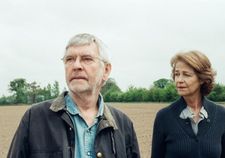 |
| On Geoff and Kate Mercer: "They are both falling back into ideas of who they were when they were younger." |
AH: I looked at it this way: lots of couples, especially British couples, they used to smoke a lot. And in this moment [when Geoff's past comes to haunt him] the thing he wants more than anything else is a cigarette because it reminds him almost of being young again, and being free and smoking. In many ways, she [Kate] probably liked him when he was a smoker. Also she realises in this moment it's what he needs, so she is not going to say "stop smoking!" I like that later on, it's her lighting up a cigarette down the line. They are both falling back into ideas of who they were when they were younger.
AKT: The last scene is a revelation. Everything comes together in the end. Was the end the starting point for you?
AH: Yes it was. In the script, the end scene was always what I had in my mind. Instead of most scripts kind of undulate in what happens, we had a starting point and we were slowly building to this final moment. Everything is about building to that moment. It was the key image of the film. It was almost as if I went backwards from that.
AKT: When did the songs come in? You start with Kate humming Smoke Gets in Your Eyes.
AH: Yeah, whistling and singing it.
AKT: Oh, there are the cigarettes again. I didn't even catch that.
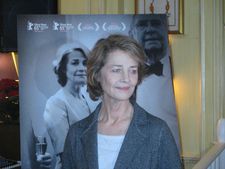 |
| Charlotte Rampling at the tea hosted by Diane von Furstenberg Photo: Anne-Katrin Titze |
AH: It's my obsession. I wish I could start smoking again. Maybe that's what it is.
AKT: When did you quit?
AH: Maybe ten years ago. It's been a long time. There's something about what you were like when you smoked. You felt freer, well, I did anyway. The music - when I wrote the script, the tracks were all pretty much in the script so it was part of the story, really. Songs that meant something to them.
AKT: Charlotte Rampling is fantastic in it. How did she come onboard?
AH: I just sent her the script. I wrote her a letter and rang her up and had this nice conversation with her. And then at the end of the conversation, I think she was like "yep, let's do it."
AKT: There is something so filmic about the idea of an alternate reality, another life that you could have had. That's what cinema is providing, too.
AH: That's true. That's the key. It's the anxiety of thinking there could have been another life. When you start to think about the choices you made in your life, you can't help but worry, oh my god, did I make the wrong choices? What would have happened if I had made another choice? So, definitely, it was about Kate's crisis -more than about anything else.
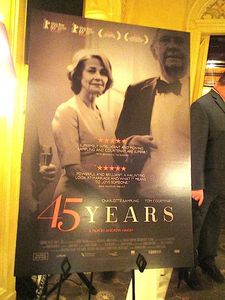 |
| 45 Years US poster at the Plaza Athénée Photo: Anne-Katrin Titze |
AKT: It's the forbidden door in Bluebeard.
AH: The attic.
AKT: The dead woman in the attic in this case. Was it always the attic?
AH: The ghosts. It was always the attic. I just love the idea that the past was above them. All of their memories is stored in boxes and crates and pushing down on the ceiling almost.
AKT: The way you shot the scene in the attic is where you most digress from the realistic. The specters are taking over and you use film in a different way.
AH: Yes, it becomes like a ghost story. Later on when she puts her hand up and feels the air coming down from the attic - for me it feels like a ghost story almost.
AKT: The frozen body in the ice that is found decades later and remained unchanged is also like cinema.
AH: It's such a strong metaphor.
45 Years opens in the US on December 23.





















